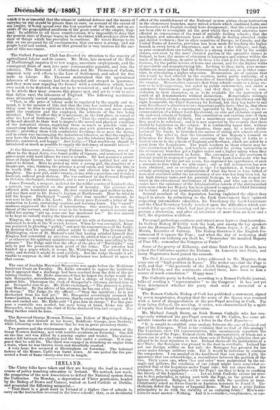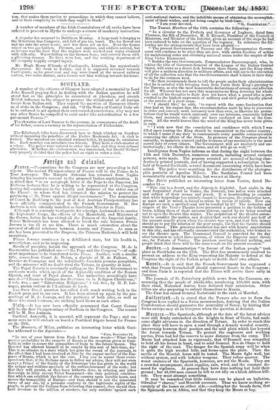IRELAND.
The Ulster folks have taken and they are keeping the lead in a sound course of policy touching education in Ireland. We noticed, last week, the prospectus of the new Association to defend the National system from the Cullenites. On Monday, a-deputation of Ulster gentlemen, headed by the Bishop of Down and Connor waited on Lord Carlisle at Dublin, and presented the following memorial- " That there is a great want in Ireland of a higher class of schools to carry on the instruction received in the lower schools; that, as an incidental
effect of the establishment of the National system giving cheap instruction in the elementary branches, many mixed schools which combined Latin and mathematics with English reading have disappeared ; that the colleges have not been able to accomplish all the good which they would otherwise have effected in consequence of the want of suitable feeding schools that the merchants and manufacturers have a difficulty in finding educated clerks and skilled workmen ; that in other countries of Europe, in Canada, and the United States of America, provision has been made for teaching the higher
i branch in every town of importance, and in not a few villages; and that, as your niemonalists can testify, there is a strong desire felt by the middle classes, and even by the more elevated portion of the operative classes in Ireland i
to have the means of education in languages and science within the reach of their children, in order to fit those who wish it for the learned pro- fessions, for the public service at home and abroad, and for, the higher walks of mercantile and manufacturiug life. Looking to these facts, your memo- rialists are most anxious that the Government should aid, as in other coun- tries, in stimulating a higher education. 3Iemorialists are of opinion that this would be best effected by the erection, under public authority, of .a number of schools for the higher branches of knowledge in various parts of the country. Memorialists conceive that these schools ought to a large ex- tent to be self-supporting, but aided by public endowments, and under a systematic Government inspection ; and that they ought to be non- sectarian in their character, so as to be available for the instruction of youth of all denominations without distinction. Memorialists willingly leave the details of such a measure to be arranged by your Excellency and the right honourable the Chief Secretary for Ireland, but they beg leave to call your Excellency's attention to two important public facts—One is, that there has been drawn out by a commission appointed by her Majesty, on the re- commendation of a former Lord-Lieutenant, an able and elaborate report on the endowed schools of Ireland. The constitution and existing state of these schools are there fully set forth, and a unanimous opinion expressed that they need to be reformed • and it is now expected by the country that there should be legislation on the subject. It is confidently hoped that, without interfering with the will of the founders, there may, by a better distri- bution of the funds, be furnished the means of aidiug new schools all over Ireland. The other is that the Committee of her Majesty's Council on Education for Great Britain does encourage the teaching of Latin to a limited extent in the schools of England and Scotland, which are aided by a grant from the Legislature. The pupil teachers in these schools may re- ceive instruction in Latin, and teachers qualified for giving instruction in the elementary branches get a higher status and a higher salary when they can stand an examination in Latin. The extension of a like provision to Ireland would be reckoned a great boon. Every Lord-Lieutenant who has been in Ireland for the last six years, has expressed his approbation of such a measure as that which we now crave ; and as full information has now been obtained, and as everything is ripe for legislation, it would be pe- culiarly gratifying to your memorialists if what has been so long talked of were now executed under the Lieutenancy of one who has long been led, by his high literary tastes and his patriotic feelings, to take the deepest in- terest in the educational institutions of Ireland, and who can on this Gee casion have the assistance of the Administrative talents of the distinguished statesman whom her Majesty has been pleased to appoint as Chief Secretary for Ireland. And your memorialists will ever pray. '
Several members of the deputation having explained the object they hoped to attain by submitting to the Irish Government their opinions respecting intermediate education, his Excellency the Lord-Lieutenant and the Chief Secretary briefly touched upon the difficulties which sur- rounded the question which had just given rise to so interesting and im- portant a discussion, and after an interview of more than an hour and a half, the deputation withdrew.
Pro-papal gatherings continue and attract more laymen than heretofore. In Galway Bishop M'Evilly took the lead, and among the lay speakers were the Honourable Thomas Ffrcncb, Mr. Pierse Joyce, J. P., and Mr. Morris, Recorder of Galway. The Bishop threatened the English Go- vernment if it oppose the Pope ; and when the day of reckoning shall come round our rallying cry shall be, "Remember the insulted Majesty of Pius IX.; remember the Congress of Paris."
Some of the gentry of Kilkenny, and three Irish Peers in Meath, have joined the Cullenites against the Italians. In Limerick two Peers, and many Magistrates have joined the crusade.
The Cork Examiner publishes a letter addressed to Mr. Maguire, from some one of "high position in Rome." The writer says that the Pope is well, and that the pastorals of the Irish Bishops, the great meetings held in Dublin, and the sentiments elicited there, have been to him a source of much consolation." Happy man !
The Cullenite party in Ireland, according to a Roman Catholic journal, talks of sending a representative " to the Congress ! It has not yet been determined whether the party shall send a memorial or a " delegate."
The Roman Catholic Bishop of Cork has published a statement, signed by seven magistrates, denying that the name of the Queen was received with a burst of disapprobation at the pro-Papal meeting. in Cork. Far from being disloyal, the meeting, it seems, was characterized by a spirit of loyalty that found frequent expression.
Mr. Michael Joseph Barry, an Irish Roman Catholic who has cou- rageously withstood the pro-Papal crusade of Dr. Cullen, has some ad- mirable remarks on the subject in a letter to the Cork Reporter- " It is sought to establish some analogy between the case of Ireland and that of the Romagna. What is the evidence that we find of this analogy ? The Legations elect 124 representatives, who unanimously repudiate the Government of the Pope; Ireland elects 105 representatives, of whom not'a dozen can be got to condemn even those acts of British legislation that are alleged to be most injurious to her. Ireland shows all the institutions of a free State ; the Romagna was ground to the dust in servitude. Ireland has not one foreign soldier on her soil ; the Romagna has groaned for ten years under foreign military rule. But it would be ludicrous to continue the comparison. I am amazed at the hardihood that can assert, I pity the ignorance that can acknowledge, a resemblance between the position of the two. Sixty years ego, when 'law and order' were maintained by the tri- angle and gallows, the condition of our island might have somewhat re- sembled that of the Legations under Papal rule ; but not since then. Are Irishmen, then, to sympathize with the Pope ? are they to help in crushing the liberty of the Legations Let no Irish Catholic excuse his trea- son to free principles, in taking part with the Pope, on the ground of re- ligious obligation. Religion has no concern with the question at issue. Christianity asked no Swiss Guards or Austrian bayonets to found it. Ca- tholicism defied the legions of Imperial Rome. What has a petty Italian principality to do with the stability of an enduring fabric ? con- sciences must answer—Nothing. And it is cowardice, complaisance, or cus-
tom, that makes them parties to proceedings in which they cannot believe, and at their complicity in which they ought to blush."
A number of members of the Irish Constabulary of all ranks have been ordered to proceed to Hythe to undergo a course of musketry instruction.
A singular fire occurred in Dublin on Monday. A large tank belonging to the Hibernian Gas Company, and full of gas tar, burst. The tar flowed out and ran into the retort house, and was there set on fire. Next the flames seized on two gas holders. Firemen, and engines, and soldiers arrived, but so intense was the frost that the engines were worked and water obtained with difficulty. Water falling on the firemen froze, and covered them with a glittering armour. No lives were lost, and the working department of the company happily escaped injury.
Mr. Hugh Many O'Grady of Castlegarde, Limerick, has mysteriously disappeared. He went to Dublin, and it is supposed returned towards Castlegarde, as his great coat and rug were found at the nearest railway station, two miles distant, and a farmer saw him walking towards his home.































 Previous page
Previous page